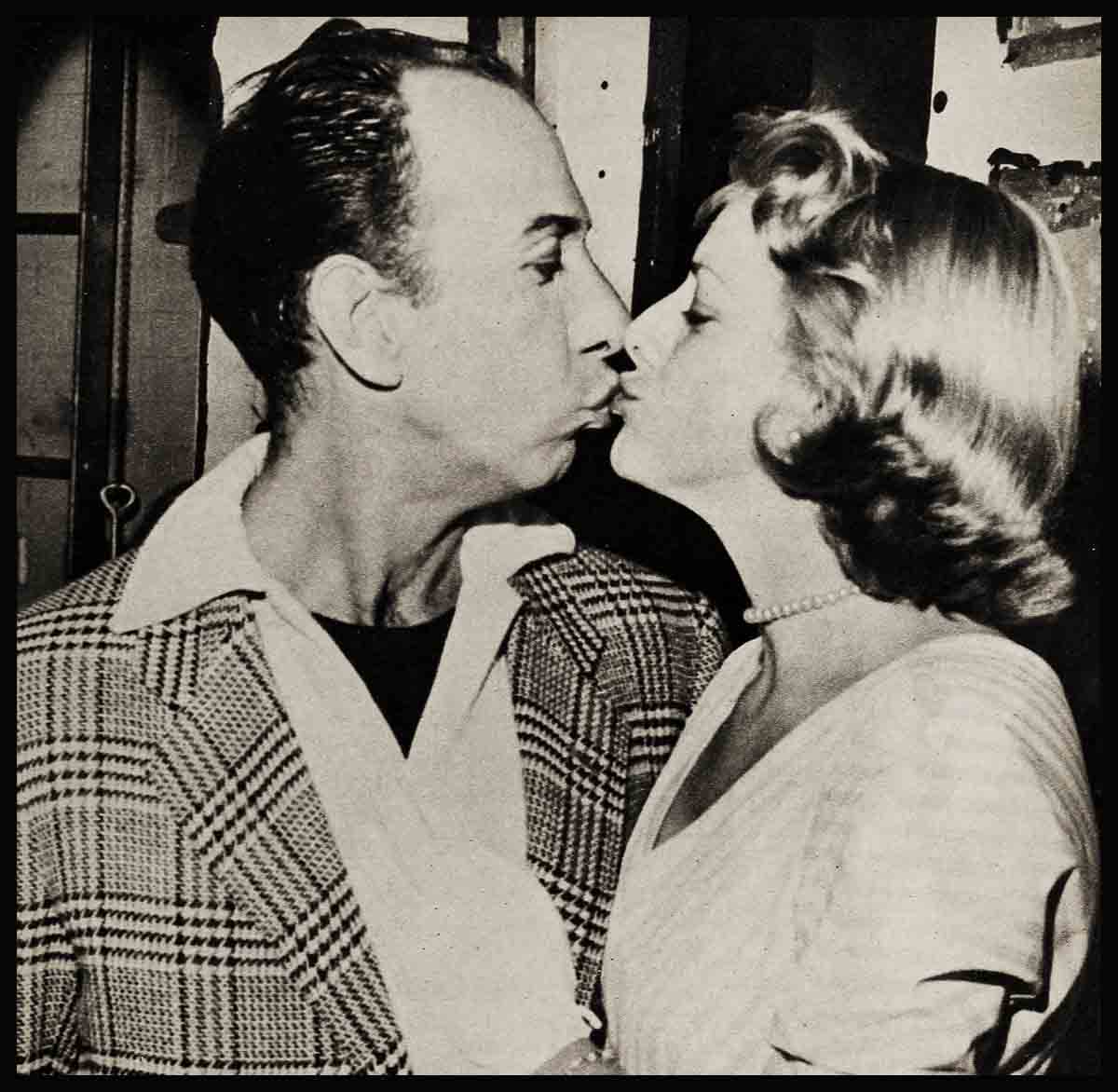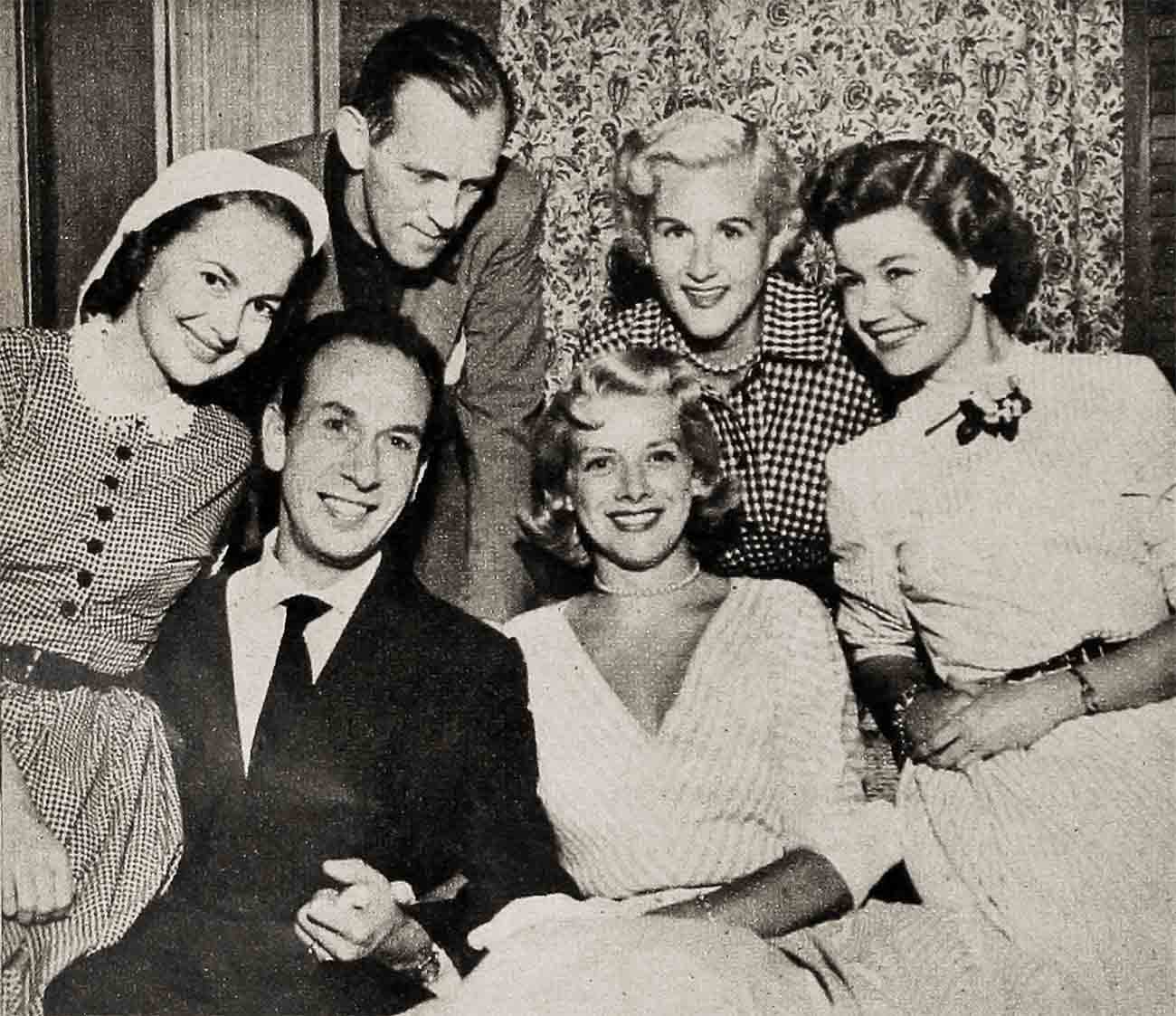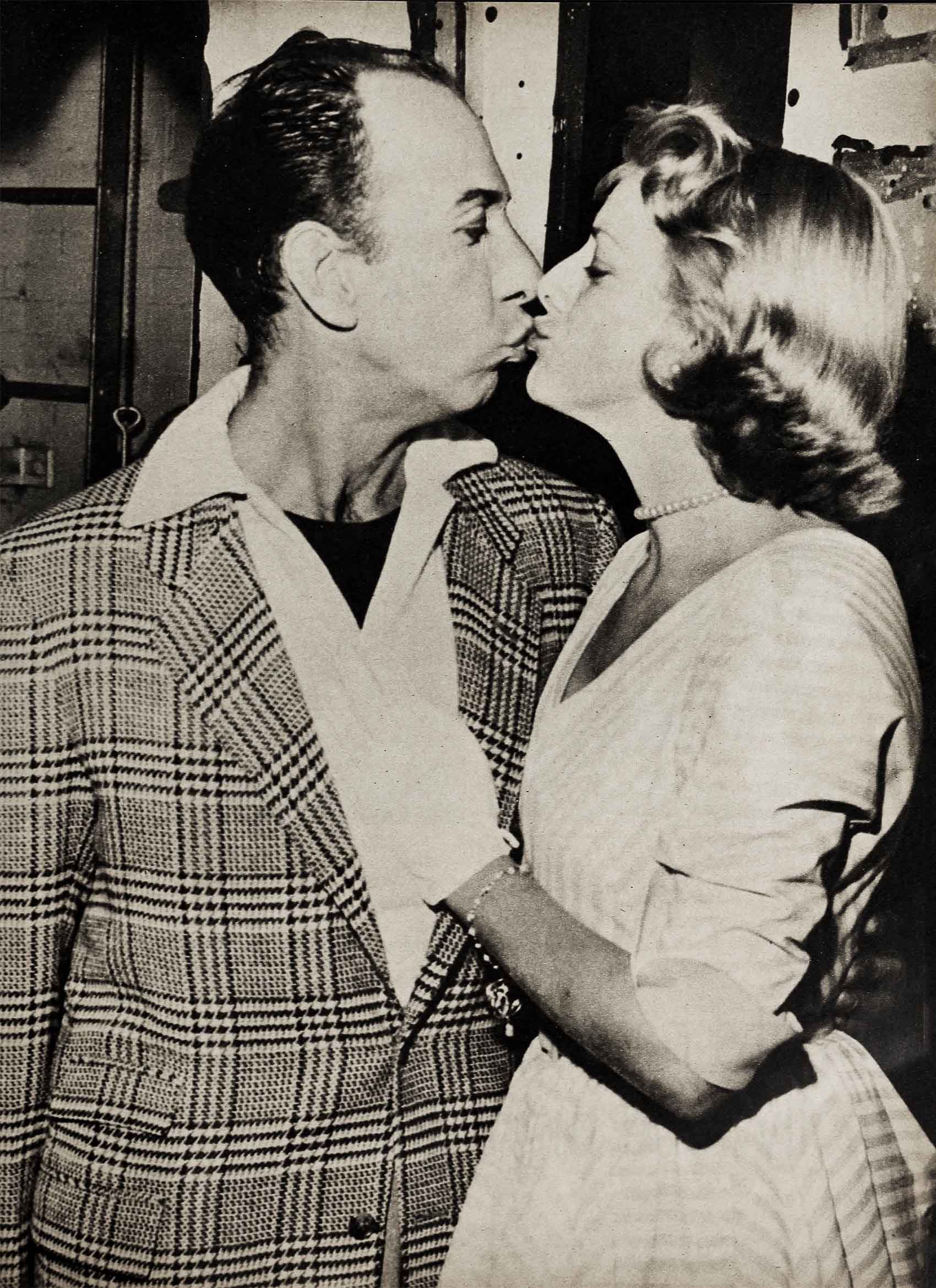
Ring Around Rosemary Clooney
When the news broke in Cincinnati a few weeks ago that Rosemary Clooney, 25, of Maysville, Kentucky, and José Vicente Ferrer, 41, of Ossining, New York, had gotten married in a small Oklahoma town, four hours’ ride from Dallas, a young woman who had once gone to Withrow High School with Rosemary leaned across the breakfast table. She handed her husband the morning newspaper and pointed to the Clooney-Ferrer wedding announcement.
“Now,” she snapped, “I believe in miracles.”
The husband of the young society matron read the brief news item and said, “What’s wrong with their getting married?”
“Nothing. Except that if Rosemary Clooney, can get a famous husband, so can any other girl on earth. Do you know, Dick, that when she was at Withrow, Rosemary was blackballed by four different sororities?”
The husband looked at his wife as a man might regard a backward child, with a mixture of love and pity. “There is nothing more cruel in the world,” he said softly, “than the snobbishness of adolescent girls.”
There was a time only a few months ago when recalling the hurt and poverty and bitter frustration of her youth, Rosemary Clooney would undoubtedly have agreed with the above statement. But now that she is Mrs. José Ferrer, she is so thrilled with the newness of marriage, so happy in her recently-rented Beverly Hills home, so altogether in love with Joe that the memories of humiliations she suffered as a child are in cold-storage.
And yet to those who knew her as a too-thin, jut-jawed, spindle-shanked girl it seems like only yesterday when she was aboard the Island Moon, an excursion steamer winding down the Ohio. Hundreds of high school boys and. girls were heading for the picnic grounds, and Rosemary, dressed in cheap little frock, made over by her Grandmother Guilfoyle, turned to her best friend. “I’m desperately in love with—” and she pointed out the local handsome Lothario. “I’d give anything to have a date with him.”
“It’s all set,” the friend told her. “I know him very well. Don’t worry, Rosemary, I’ll fix it.” So she went to this boy and told him that Rosemary Clooney was just dying to meet him, and the teenage Don Juan said, “Sure. Bring her over. I’ll give her a whirl.” So Rosemary was brought over and was introduced to her secret love.
The boy took one look at her—the flat chest, the crooked teeth, the large mouth—and closing his eyes as though they could not stand the sight of this teen-age female horror, he shook his head in violent. disbelief. “Oh, no!” he wailed. “Oh! No.”
Rosemary Clooney’s youth was filled with such incidents. “I used to look at myself in the mirror, and it was awful. . . . We never had a permanent home . . . I was never much to look at . . . No sorority really wanted me.”
With what is amazing candor for any woman, these are the sort of remarks which used to sprinkle Rosemary’s reminiscences. But now that her love, long prison-pent and repressed, has been released in marriage, she feels fulfilled and requited. Whereas she has felt bitter toward those who scorned and snubbed her because of her poverty, she now looks back upon them with pity and understanding. For in her life as a newlywed there is room in her heart for nothing save love and José Ferrer—which she considers synonymous.

When Rosemary, the daughter of an impoverished Kentucky house painter, eloped to Durant, Oklahoma, with José, the son of a wealthy Puerto Rican attorney, no one in Hollywood was the slightest bit surprised. For Rosemary had been Ferrer’s steady girl for months.
Paramount tried to put the silencer on the news because technically Ferrer was still married to his second wife, Phyllis Hill, and the studio was in the process of giving Rosemary a Cinderella buildup—but the Ferrer-Clooney love affair never was a secret.
As soon as Ferrer could arrange a financial settlement with Phyllis Hill, all of his friends expected him to make Rosemary the third Mrs. Ferrer. As one of them points out, “Rosemary complements Joe very nicely. He’s so intense, and she’s so matter-of-fact. There’s a very good balance there. Complement instead of conflict.”
There is also the question of physical attraction. Some detractors insist that all of Rosemary’s sex appeal lies in her vocal chords. Others are of the opinion that she generates as much sex as a grape. There is no accounting for diversity in human taste, but when José Ferrer first met the Clooney girl in Lisa Kirk’s Manhattan apartment, he liked what he saw in the way of figure, face, and personality, and he liked it very much.
A man of depth and probity, Ferrer has never picked his wives on the basis of physical beauty. The mind, the mentality, and the manner—these have always intrigued him.
In Rosemary he found a young girl who has not, to date, been disillusioned by life. He found a simple, honest, ambitious girl without polish, erudition, or background; and whether she appealed primarily to the Pygmalion drive characteristic of so many actors and directors, he isn’t saying. But she intrigued him, and they began to go around together.
Rosemary first made certain that Joe was definitely estranged from his wife. “When we go out,” she said, “I want it to be in the open, not sneaking around to hideouts.”
It was a transcontinental courtship with these two. They ate at Sardi’s in New York; Chasen’s in California, and all the while, Ferrer’s lawyer, Edwin Reiskind was trying to work out some sort of settlement which would satisfy the second Mrs. Ferrer and give Joe his freedom.
When the second Mrs. Ferrer went into a New York play, The Fifth Season, it looked very much as though there would be no Ferrer divorce this year. After all, when would Phyllis Hill be able to get away to establish six weeks’ residence in Reno or Hot Springs?
There was only one solution—a Mexican divorce. It is possible for a citizen of the U.S.A. to obtain a divorce in Mexico without any of the parties’ going there.
On July 6, this year, Mrs. Phyllis Hill Ferrer filed for divorce in the First Civil Court of Juarez, Mexico. She was in New York at the time, and her husband was in Dallas, starring in the stage version of Kiss Me Kate. The suit stated that the Ferrers had been married in Greenwich, Connecticut, in 1948, and had been separated since May, 1952. Incompatibility was the major charge, and the divorce was granted.
Whereupon Rosemary Clooney, having just finished Red Garters over at Paramount, caught the first plane to Dallas for a rendezvous with her lover at the Stone-leigh Hotel.

Ordinarily, Joe and Rosemary Ferrer are cooperative and communicative people, but when reporters asked if they intended to get married in the near future—an intention as obvious as Marilyn Monroe’s physical endowments—both of them said, “No comment.”
They waited for Joe Shribman, Rosemary’s manager, to fly into Dallas, and for Ed Reiskind and Kurt and Ketti Frings and Olivia De Havilland and the cast of The Dazzling Hour—Ferrer rehearsed the cast in Dallas for the play he later staged in La Jolla—and after the whole gang had arrived, and Ed Reiskind had checked on all the legal requirements for marriage in and around Texas, Joe and Rosemary decided to take the big step. “We wanted it done quickly, simply, and without any fanfare.”
Early Monday morning the prospective newlyweds, accompanied by Joe’s agent, Kurt Frings, and Mrs. Frings, climbed into Ed Reiskind’s car and drove to Durant, Oklahoma. Joe Shribman came along, too. The lovers took blood tests, filled out the marriage license, and then marched into the chambers of County Judge Seth Shoemaker who performed the short ceremony.
There was the usual kissing at the end of. the ritual and then the drive back to Dallas. That night, José went to work in Kiss Me Kate, and when the final curtain came down, everyone went over to Mario’s, an Italian restaurant in town, for the Ferrer wedding party. It was a humdinger, considering the fact that Ferrer had to work the next day.
There was no honeymoon. Im fact, the following afternoon, Rosemary kissed her Joe goodbye and took off for Hollywood with Kurt Frings. Kurt left his wife Ketti in Dallas to work with Ferrer on the rewrite of The Dazzling Hour.
In Hollywood, Rosemary posed for some MODERN SCREEN photos, had her hair trimmed, tried on a new dress for the premiére of Stalag 17, announced that “I came back because my brother, Nick, is going into the service, and I promised I’d go to the preview with him.”
She was so happy, she was jumping. “Flippin’ my lid,” she cried. “Just flippin’ my lid. Never been happier.”
Hollywood wonders how long this ecstatic happiness will last, since the years have shown consistently that two acting careers in one family usually lead to discord and divorce.
There is one particular group in the movie colony which dislikes José Ferrer on the basis of his politics. These people insist that “the only thing José Ferrer can ever stay married to is his career.” They warned and advised Rosemary not to marry the producer-director-actor, but the Clooney girl decided to follow her heart.
There are other groups in Hollywood that insist that Joe is one of the most intelligent, versatile, and sensitive talents in the business. Not only that, but that his background, education, and perspicacity are hard to match, and that as a human being, he is kind, tolerant, warm-hearted and generous. For years he has carried countless persons on his payroll. A young dancer in Paris, for example, receives a check from him every month, merely be cause he knows that she needs the money.
José Vicente Ferrer Oteroy Cintron was born on January 8, 1912, in Santuro, Puerto Rico. Both of his parents were born in Spain, later becoming American citizens. His father attended St. John’s College at Annapolis and won his law degree at Syracuse University. His mother was graduated from Sacred Heart College in New York.
When young José was six, his parents took him to New York where he was enrolled in a series of private and public schools. At 14, the boy was considered a piano prodigy, and for a while he hoped to become a concert pianist. But his folks shipped him off to Switzerland for more schooling, and when he returned to the States he decided to enter Princeton’s School of Architecture.
While he was in college, Ferrer organized a six-piece band known as Ferrer’s Pied Pipers. It was quickly expanded to include 18 members, and during the summers, it used to tour Italy, France, and Switzerland, which is one reason Ferrer speaks five languages with surprising fluency.
While he was at Princeton, Joe—this is the name by which all his friends call him—decided to become a teacher. He took a year’s graduate work in French literature and then moved on to Columbia University where he studied for his Master’s degree.
At Columbia, Ferrer decided to forsake teaching for the theater and got himself a job as an assistant stage manager in Josh Logan’s summer stock company at Suffern, New York. From there he worked himself up to his current eminence.
Now let’s take a look at Rosemary Clooney’s background. This singing chick was born in the small Ohio River town of Maysville, Kentucky on May 23, 1928. Her father, Andy Clooney was a house painter who couldn’t find enough houses to paint, especially when another daughter and a son were added to his family.
In fact, things were so bad in the Clooney household, financially that is, that the marriage came apart, Rosemary’s mother going to work in a dress shop in Lexington, and Andy looking around for a new start in Washington.
The Clooney kids were moved around from grandparent to grandparent. Grandpa Clooney, the perpetual mayor of Maysville, owned a jewelry store and had a little money but when Rosemary was nine, Grandma Clooney died, and the little sail was moved over to Grandmother Guilfoyle’s. A widow with nine children of her own to look after, Grandma Guilfoyle found it extremely difficult to bring up Rosemary and her sister. There just wasn’t enough money to go around.
Rosemary had to wear hand-me-downs and makeshifts. Dental treatment was neglected. Family security was lacking when she needed it most.
In short, she suffered all the pains and heartaches and humiliations which walk hand-in-hand with poverty. The wonder of it all is that Rosemary Clooney is an optimistic, lively, and stimulating young woman, today.
While she may suffer from an inferiority complex brought on by the lack of physical beauty, she certainly gives no blatant manifestations of chronic insecurity. Rosemary tells of her poverty-ridden days with poignancy but she always points out the lighter side and the happy moments. She talks about the wonderful breaks she got when she and her sister went to. work at WLW in Cincinnati, when she signed with Tony Pastor’s band and when Joe Shribman, Pastor’s manager, got her a recording contract with Columbia Records.
Blue-eyed Rosie was often hurt when she was a child. While these hurts undoubtedly have left their mark, they have not marred her personality or outlook. Rosemary Clooney wants to become a big motion picture star. Right now she has a personable way, a pleasing voice, and a little acting talent.
Married to José Ferrer, however, Rosie is likely to improve as an actress. She have an excellent influence in the house. There is no doubt but that José can and will enrich Rosie’s life. He cooks like a master chef, he plays the piano like a virtuoso; he paints and sculptures; he produces, directs, and acts, he lives every day as if it were his last.
A friend of Clooney’s was asked what Rosie could contribute to this marriage. Her retort: “What is this? France in the nineteenth century or Hollywood in the twentieth? All a woman brings to a marriage is herself. Sometimes that’s a little, and ‘sometimes that’s a lot. In Rosie’s case, I can tell you—it’s enough!”
THE END
—BY PETER PRESTON
(José Ferrer can be seen in two Columbia pictures, The Caine Mutiny and Miss Sadie Thompson.)
It is a quote. MODERN SCREEN MAGAZINE OCTOBER 1953




